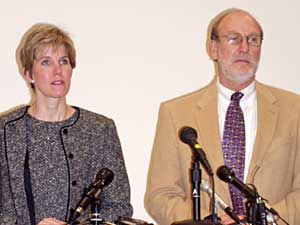|
Audio
Photos
More from MPR
Resources
Your Voice
|
First case of flu confirmed in Minnesota
October 18, 2004
The Minnesota Health Department says a Minneapolis woman is the first person to get the flu in Minnesota this season. Health officials are watching this year's flu outbreak particularly closely, because of the flu vaccine shortage. British health authorities shut down one of the two manufacturers that provide the vaccine to the U.S. The move has forced health officials nationwide to prioritize the vaccine -- and urge the public to remain calm.
St. Paul, Minn. — The season's first flu case isn't usually big news. After all, influenza shows up every year between Halloween and Christmas in Minnesota. But this year, the shortage of vaccine is making health officials and some patients nervous.
State epidemiologist Harry Hull says a 44-year-old woman was diagnosed with the flu when she visited a health clinic. It's an earlier report than the past couple of years, when the first cases didn't show up until November or December. Hull says people shouldn't read too much into the timing of the state's first flu case. He says he doesn't know if this year's outbreak will be better or worse than last year.
"It's difficult for us to predict the severity of any individual flu season, so we really can't say what it means," says Hull. "It may turn out that although we have our first isolate now that the peak may not occur until December, or maybe even January or February."
Health officials are crossing their fingers that it will be a mild flu season. The department's chief flu expert, Kris Ehresmann, says she's hopeful that every high-risk individual will get a flu shot this year. Last week, Ehresmann said the state had about half of the shots needed to treat the high-risk population.
|
We're going to be reassessing what our needs are in regard to the high-risk populations in the state. But yes, we continue to have gaps in our supply.
- Kris Ehresmann, state Health Department |
Ehresmann says the federal government is expected to provide a small amount of the vaccine to Minnesota, but says it's likely that some with the highest risk won't be vaccinated.
"We're going to be reassessing what our needs are in regard to the high-risk populations in the state. But yes, we continue to have gaps in our supply," she says.
Ehresmann says some local public health clinics, hospitals and employers are all working to ensure that high-risk groups, particularly in nursing homes, are getting their flu shots.
Shane Roche, executive director of The Golden Crest Health Care Center in Hibbing, says the local hospital came through with flu shots for their 70 residents when the nursing home reported its shortage.
"We didn't have a lot of difficulty. We found that the people who were redistributing the vaccine were very helpful in obtaining supplies for us," says Roche.
But some other nursing homes across the state aren't as lucky. The Health Department reports that there are shortages in some rural parts of the state. The report says nursing homes in St. Louis, Otter Tail and Crow Wing counties are particularly hard hit.
Another concern is for businesses that have to cancel their flu shots for their employees.
"A lot more people are going to be out sick, going to their doctors," says Sue Messinger, president of the Society for Human Resource Management in Alexandria, Virginia. She says employers should expect a double-whammy as a result of the vaccine shortage. First off, she says employers should expect a loss of productivity because of additional sick time.
Second, Messinger says employers should expect higher health care costs when they meet with their benefit managers next year. That's because most insurance companies gauge future rates on past hospital and doctor visits.
"If you have data that suggests that people are going to go to the doctor a lot more frequently this year because they don't have a flu vaccine, you're going to see more costs. It's not good for employers," she says.
Messinger says she's telling business owners to remind their workers of the tried and true ways of preventing the flu and other colds -- wash your hands regularly, cover your mouth when you cough or sneeze, and stay home from work when you're sick.
|
News Headlines
|
Related Subjects
|

